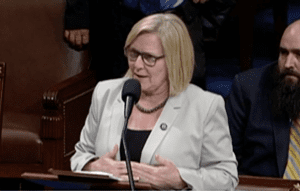GOP lawmaker lies about Jan. 6 committee selection being 'partisan'
Rep. Michelle Fischbach (R-MN) claimed the select committee to investigate the Capitol insurrection would be more partisan than the Benghazi select committee.

The House voted 222-190 on Wednesday in favor of a resolution on the creation of a select committee to investigate the riot by supporters of Donald Trump at the U.S. Capitol on Jan. 6.
Leading up to the vote, Rep. Michelle Fischbach (R-MN) claimed multiple times that the committee would be too partisan and thus different from the select committee Republicans convened to investigate the 2012 terrorist attack on the U.S. consulate in Benghazi, Libya.
The language on the creation of the new select committee is virtually identical to the language used in creating the Benghazi select committee — which, as E.J. Dionne wrote in an opinion piece published by the Washington Post in 2015, then-House Majority Leader Kevin McCarthy admitted was a naked move to damage then-Secretary of State Hillary Clinton politically.
The resolution introduced in May 2014 on creating a Select Committee on the Events Surrounding the 2012 Terrorist Attack in Benghazi says, “The Speaker shall appoint 12 Members to the Select Committee, five of whom shall be appointed after consultation with the minority leader.”
The resolution introduced on Monday on creating a Select Committee to Investigate the January 6th Attack on the United States Capitol says, “The Speaker shall appoint 13 Members to the Select Committee, 5 of whom shall be appointed after consultation with the minority leader.”
The only difference between the two select committees is that there is one more member of the committee to probe the insurrection.
And House Speaker Nancy Pelosi said she plans to give one of her eight spots to a Republican lawmaker, meaning Republicans would actually have more representation on the insurrection committee than they had on the Benghazi committee.
Fischbach said during debate on resolution on the creation of the new select committee:
The gentleman from Massachusetts continues talking about how this select committee has been modeled after the Benghazi select committee, but “modeled” is a very loose term, given that this committee obviously has a far more skewed ratio than the Benghazi committee did. And in addition to that, on this committee, this can be all appointed by the speaker. In her own words she agreed that, yes, she could appoint them all. In the Benghazi select committee, there was recommendations taken from the minority to the majority in order to appoint that membership. So to say that this has been modeled after the Benghazi — maybe because they have the name “Select Committee” and that’s the model they used, but certainly the membership and the makeup of this is not the bipartisan issue that it was on the Benghazi select committee.
But Fischbach didn’t stop there.
She continued to claim that there was a difference in the process of selecting members for the two committees.
“It is my understanding that when Speaker Pelosi was asked if she could veto Republican picks for the select committee, Speaker Pelosi responded ‘Yes. We’ll see who they nominate,'” Fischbach said. “That opens the door for the committee’s work to be corrupted even before it begins, and she continues to have full control over the members of that committee.”
Rep. Jim McGovern (D-MA), chair of the House Rules Committee, responded, “Let me again say, it is the exact same language that was in their Benghazi Select Committee, and I am happy to send over a paper copy so that they can see it.”
Pelosi did say on Tuesday that she could overrule any recommendations from McCarthy, suggesting that members who voted to block certification of Joe Biden’s victory in the 2020 presidential election could be rejected.
This is exactly the same authority the resolution on creating the Benghazi committee gave Republican John Boehner when he was House speaker in 2014.
Fischbach was one of 147 GOP lawmakers who voted to block Biden’s Electoral College victory from being certified, even after the mob of Trump supporters violently broke into the Capitol to block a peaceful transition of power.
Fischbach also voted against creating an independent bipartisan commission to probe the insurrection, which would have had five of its 10 members appointed by Republicans and five by Democrats.
Ultimately, Democrats resorted to creating a select committee to investigate the insurrection because Senate Republicans blocked the creation of the independent commission. Republican leaders reportedly opposed the bipartisan commission out of fear its revelations about Donald Trump and other Republicans could hurt the GOP in the 2022 midterm elections, when it will try to win back control of the House and the Senate.
Only two Republicans, Rep. Liz Cheney of Wyoming and Rep. Adam Kinzinger of Illinois, voted in favor of the resolution. Cheney released a statement ahead of the vote along with a tweet that read, “I’ve said before that a bipartisan independent commission would’ve been the best way to investigate the Jan. 6th attack. That effort was unfortunately blocked. A select committee is now the only remaining option. I will vote to support it.”
Published with permission of The American Independent Foundation.
Recommended

Florida abortion ban puts GOP Rep. Anna Paulina Luna’s anti-choice views in spotlight
Luna supports abortions bans with no exceptions for rape
By Jesse Valentine - May 07, 2024
Republican Caroleene Dobson wants Alabama abortion ban to go nationwide
Dobson is the Republican candidate in what will be one of the most-watched House races of 2024.
By Jesse Valentine - April 30, 2024
Direct mailers distort California Democrat Will Rollins’ record
Rollins, a former federal prosecutor, is challenging incumbent GOP Rep. Ken Calvert.
By Jesse Valentine - April 25, 2024







































































